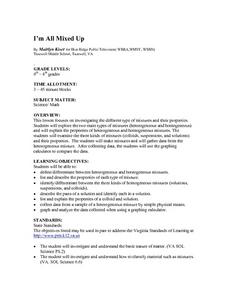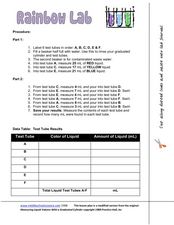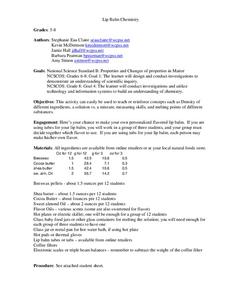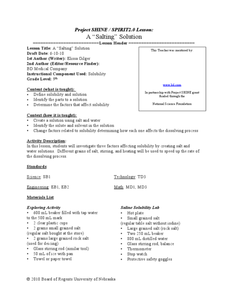Curated OER
Separation of a Complex Mixture
Students develop a method to separate different types of mixtures. In this chemistry activity, students model the steps in the scientific method. They perform the experiment and analyze data.
Curated OER
Solutions
In this solutions instructional activity, students calculate molality and mole fraction. Students define colligative property and determine what affects the solubility of gas in solvents. This instructional activity has 2 short answer...
Curated OER
I'm All Mixed Up
Middle school scientists compare and contrast heterogeneous and homogeneous mixtures. They differentiate solutions, colloids, and suspensions by examining samples of each. Note that the bulk of the lesson plan directs you how to...
Curated OER
Filter It!
Elementary schoolers who are learning about filtration and mixtures could use this worksheet to gain practice in filtering techniques. In it, they are asked how to manipulate a container in a way that would lead to properly filtering...
Virginia Department of Education
Mystery Iron Ions
Young chemists perform an experiment to determine if a compound is iron (II) chloride or iron (III) chloride. Then they determine the formula, balance the equation, and answer analysis questions.
Curated OER
Lab: Percent of Composition of KClO3
Students find the percent of oxygen in potassium chlorate. In this percent composition lesson plan, students heat a solution of potassium chlorate using a catalyst, manganese dioxide, to decompose the potassium chlorate and release...
Virginia Department of Education
Macromolecules
Finally, a chance for the class to play with their food! Allow pupils to simulate stomach acid with common foods, and introduce specific macromolecules into the mixture to explore characteristics of carbohydrates, lipids, and proteins....
Cornell University
Nano Interactions
Tiny particles can provide big learning opportunities! Middle school scientists explore the world of nanoparticles through reading, discussion, and experiment. Collaborative groups first apply nanotechnology to determine water hardness....
Aquarium of the Pacific
States of Matter: Making Ice Cream
Who knew that learning about the states of matter could taste so sweet? This fun hands-on lesson captures the attention of learners as they use what they know about solids, liquids, and gases to create their very own batch of ice cream.
Teach Engineering
Understanding Elements
Nothing says organization quite like a table. The third lesson in a six-part Mixtures and Solutions unit teaches young scientists about elements and the periodic table. They learn how the periodic table is organized and about the...
Teach Engineering
The Building Blocks of Matter
Everything can be reduced to atoms. The first installment of a six-part Mixtures and Solutions unit focuses on the building blocks of matter. Scholars review basic atomic structure, including protons, neutrons, and electrons, in...
Curated OER
Rainbow Lab
In this mixtures worksheet, students experiment with different amounts of solutes and solvents to make solutions. They observe color changes and look for chemical and physical changes in the test tubes. Students answer 5 questions and...
Teach Engineering
Engineering and the Periodic Table
Elements, to the rescue! Scholars first review the periodic table, and then learn about the first 20 elements and their properties and uses in the fourth of six lessons in the Mixtures and Solutions unit. Applying their newfound...
Curated OER
Lip Balm Chemistry
Students explore density, mixture and solutions in a reaction. In this chemistry lesson, students create their own chap-stick using ingredients they analyze for their chemical contents. They discuss measuring skills, melting points and...
Curated OER
A “Salting” Solution
Ninth graders investigate the factors affecting solubility. In this chemistry lesson, 9th graders differentiate solvent and solute. They give examples of real world application of solutions.
Curated OER
Classification of Matter
In this classification of matter worksheet, students answer 5 questions about the composition of matter, solutions, colloids and suspensions, and the properties and changes of matter.
Curated OER
Fatty Acids For Soap Making
High schoolers titrate a sample of fatty acids with standardized sodium hydroxide solution. From the amount of base needed for neutralization and the mass of sample used for titration, the apparent average molar mass of the sample is...
Curated OER
WS 8.4 Percentage Problems
In this percentage instructional activity, students calculate percentages given various types of problems. They calculate percent of compounds in a solution, they calculate mass of compounds given percentages of solutions, and they...
Curated OER
Water Quality and Environmental Pollution
Learners use litmus paper to begin to discover the qualities of acids and bases. They learn about pH by testing clear liquids for acidity with purple cabbage juice as an indicator. The video Streamkeeper, with Bill Nye, and other video...
Pingry School
The Gelation of Guar Gum with Borax
Some of kids' favorite toys are the products of science experiments. Scholars follow precise measurements to mix and create their own slime and Play-Doh. They observe the changing textures and the chemical reactions throughout the...
Sunlight Cal-Tech
Chromatography of Plant Pigments
Through a hands-on activity, an acetone-spinach solution is pre-made and learners use this solution to separate the pigments found in spinach using chromatography. The comprehensive resource includes an analysis and conclusion questions.
Science-Class.net
Rock Candy Crystals
Candy is one of my favorite words, and it's an even better word when it relates to science. Yes, candy science can happen when you grow rock candy crystals with your class. The entire process for growing these edible wonders of nature is...
Curated OER
Suspensions and solutions
Students create mixtures of baking soda, baking powder, flour, and more to predict which are solutions and which are suspensions. Students follow 4 directions and answer 3 questions.
Curated OER
Solutions
In this solutions worksheet, students determine the pH or molar solubility of different solutions. Students state is the mixture given forms a buffer. This worksheet has 20 problems to solve.

























